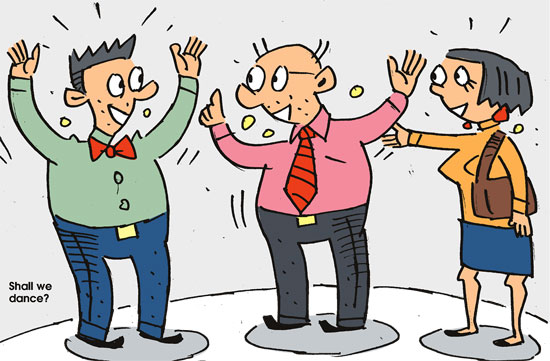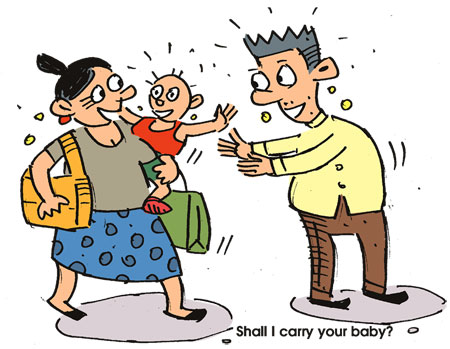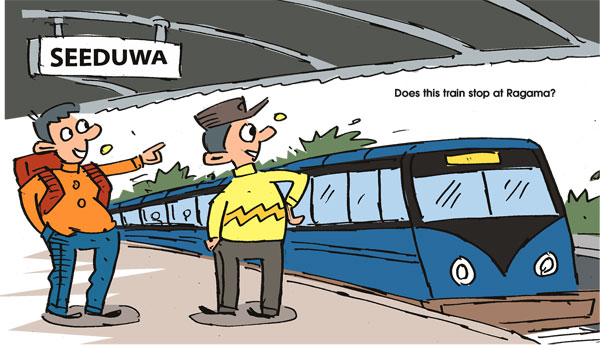|

by R. S. Karunaratne
How to use ‘shall’ in questions
We often use ‘Shall I?’ or ‘Shall we?’ when we are asking or
suggesting what to do.
Shall I?

Shall I put the television on?
Where shall I go tomorrow?
Shall I go and see Ravi in hospital?
Shall I make some sweets for you?
Shall I tell the police?
What shall I buy for Nethmi’s birthday?
When shall I phone you?
Shall I pay now?
Shall I clean the kitchen?
How many exercise books shall I buy?
Where shall I leave my motorcycle?
What time shall I meet you?
Shall I shut the door?
Shall we?
What time shall we leave for Sigiriya?
Shall we dance?
Shall we go out after dinner?
Shall we have a game of cards?
How shall we travel to Jaffna?
What shall we do after the examination?
Where shall we go during the vacation?
Shall we look for a hotel?
What time shall we meet the principal?
How much fish shall we buy?
We use ‘shall I’ as a polite form when we wish to do something for
somebody.
Shall I carry your briefcase?
Shall I make you some tea?
Shall I carry your baby?
Shall I post your letter of appointment?
Shall I do your marketing?
Shall I read the letter to you?

Shall I drive you to school?
Some speakers use ‘shall’ instead of ‘will’, but it is slightly
old-fashioned.
If you do it again, I shall be very angry.
I shall never forget this favour.
I shall not be able to meet you this evening.
Note: In all the above situations, use ‘will’ instead of ‘shall.’
We use ‘shall’ in formal expressions.
I shall look forward to meeting you soon.
We shall let you know the date of the operation.
No student shall be allowed to go out during the day.
We use ‘shall’ to say that something will happen definitely.
Don’t worry. I shall be there to meet you at the airport.
Match words and meanings
Here’s a novel way to enrich your vocabulary. Match the words in
Column ‘A’ with their meanings in Column ‘B’ and check your answers with
the key. The first one has been done for you.
[Column A]
H 1. blitz
..... 2. blizzard
..... 3. bloat
..... 4. bloc
..... 5. block
..... 6. blockage
..... 7. blockbuster
..... 8. blockhead
..... 9. bloke
..... 10. blonde
..... 11. bloodbath
..... 12. bloodhound
..... 13. bloodletting
..... 14. blood stain
..... 15. bloodthirsty
..... 16. bloom
..... 17. bloomer
..... 18. blot
..... 19. blowhole
..... 20. blowy
..... 21. blubber
..... 22. bludgeon
..... 23. blueprint
..... 24. blunder
..... 25.blunt
------------------
[Column B]
A. something that stops something else passing through
B. an ordinary man
C. a large dog for hunting
D. a severe snow storm with strong winds
E. a woman with pale yellow or gold hair
F. a book or film that is very successful
G. a group of countries with similar interests
H. a fast, violent attack on a town
I. not sharp
J. a big mistake
K. an early plan or design
L. to hit somebody hard with a heavy weapon
M. to cry in a noisy way
N. a silly or embarrassing mistake
O. eager to take part in violence
P. to swell up
Q. a small area of ink made by mistake
R. windy
S. an opening in the top of a whale’s head
T. produce flowers
U. a mark made by blood
V. killing and violence
W. an extremely violent event
X. a stupid person
Y. a solid straight-sided piece of hard material
Key:
2.D 3. P 4. G 5. Y 6. A 7. F 8. X 9. B 10. E 11. W 12. C 13. V 14. U
15. O 16. T 17. N 18. Q 19. S 20. R 21. M 22. L 23. K 24. J 25. I
Starters:
How to give short answers
We can answer a question by giving a full answer or a simple ‘yes’ or
‘no.’ Sometimes we use a short answer.
Simple ‘yes’ or ‘no’ answers

A: Is it raining?
B: Yes.
A: Did you see my dictionary?
B: No.
A: Are you coming tomorrow?
B: Yes.
A: Did you apply for the post of English lecturer?
B: No.
Short answers
In short answers, we usually put a comma after ‘yes’ or ‘no.’
A: Are we going for the show?
B: Yes, we are.
A: Did you finish the painting?
B: No, I didn't.
A: Did you open my cupboard?
B: No, I didn't.
A; Are you working on Sunday?
B: No, I'm not.
A: Did you buy the tickets?
B: Yes, I did. / No, I didn't.
A: Has Harendra got a mobile phone?
B: Yes, he has.
A: Will I need my National Identity Card for the interview?
B: Yes, you will.
A: Did he repair my car?
B: Yes, he did. / No, he didn't.
Note: A positive short answer requires ‘yes’ + a pronoun + an
auxiliary.
We use a form of ‘do’ in the present simple and past simple tenses.
A: Do you like modern art?
B: Yes, I do. / No, I don't.
A: Does he work late everyday.
B: Yes, he does. / No, he doesn't.
A: Do they visit Sri Lanka very often?
B: Yes, they do. / No, they don't.
A: Does she like you?
B: Yes, she does. / No, she doesn't.
A: Did the postman give this letter to you?
B: Yes, he did. / No, he didn't.
We form a negative short answer with ‘no + a pronoun + an auxiliary
+ isn't'.
A: Is the phone working now?
B: No, it isn't.
A: Have the children gone to school?
B: No, they haven't.
A: Will there be a board meeting tomorrow?
B: No, there won't.
A: Does this train stop at Ragama?
B: No, it doesn't.
Exception
A: Are you coming tomorrow?
B: No, I'm not.
When we answer requests, suggestions, offers and invitations, we do
not usually use short answers. Instead we use phrases such as ‘Yes, of
course’ or ‘Yes, please.’
A: Could you help me to carry these bags upstairs?
B: Yes, of course.
A: Can I give you a lift?
B: Yes, please.
[Activity]
Underline the correct answer and check your answers with the key.
1. A: Are you busy now?
B: Yes, of course. / Yes, I am.
2. A: Do you know Beatrice?
B: Yes. / Yes, she's my batchmate.
3. A: Tell me, did you steal my mobile phone?
B: No. / No, I didn't steal your mobile phone.
4. A: Do you live here?
B: Yes, I do. / Yes, I live here.
5. A: Would you like a game of cards?
B: Yes, I would like. / Yes, please.
6. A: Is it the fifth of January today?
B: Yes, it is. / Yes, it is the fifth of January today.
7. A: Did you bring your passport?
B: No. / No, sorry. I forgot it.
8. A: Can I help you with those heavy bags?
B: No, you can't. / It's all right, thanks.
9. A: Can we afford a taxi?
B: No, we can't. / It's ok.
10. A: Are you English?
B: No, I'm not. / No, I'm not English.
Key:
Yes, I am. 2. Yes, she's my batchmate. 3. No, I didn't steal your
mobile phone. 4. Yes, I do. 5. Yes, please. 6. Yes, it is. 7. No, sorry.
I forgot it. 8. It's all right. Thanks. 9. No, we can't. 10.No, I'm not.
Form adverbs from nouns
Words often come in families. You can expand your vocabulary by
becoming familiar with these word families. We give you 25 nouns in
Column ‘A.’ Write the relevant adverbs in Column ‘B’ and check your
answers with the key.
[Column A] [Column B]
1. religion ................
2. remark ................
3. repair ................
4. repeat ................
5. report ...............
6. reputation ...............
7. respect ................
8. response ...............
9. responsibility ................
10. rest ................
11. riches ................
12. right ................
13. romance ................
14. roughness ...............
15. roundness ...............
16. royalty ................
17. rudeness ................
18. sadness ................
19. safety ...............
20. satisfaction ...............
21. scare ...............
22. scholar ..............
23. science ...............
24. search ..............
25. secre ..............
Key:
1.religiously 2. remarkably 3. irreparably 4. repeatedly 5.
reportedly 6. reputedly 7. respectably 8. responsively 9. responsibly
10. restlessly 11. richly 12. rightly 13. romantically 14. roughly 15.
roundly 16. royally 17. rudely 18. sadly 19. safely 20. satisfactorily
21. scarily 22. scholarly 23. scientifically 24. searchingly 25.
secretly |

